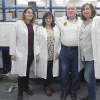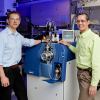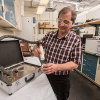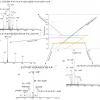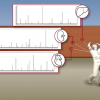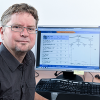Mass Spectrometry News
By measuring the height profile of the sample prior to analysis, mass spectrometry imaging can now visualise the distribution of chemical substances on samples with non-flat surfaces.
SIFT-MS has shown promising results for the detection of cancers of the oesophagus and stomach in a large patient trial presented at the European Cancer Congress 2017.
Scientists from the universities of Oxford and Manchester, UK, have used a mass spectrometry molecular fingerprinting technique to identify one Neanderthal bone from around 2000 tiny bone fragments.
University of Alabama at Birmingham, USA, researchers have made a microscopic snapshot of the early renal lipid changes in acute kidney injury, using matrix-assisted laser desorption/ionisation (MALDI) tissue imaging to localise the changes.
At a ceremony at the University of Copenhagen, Waters officially welcomed the University’s Forensic Chemistry Laboratory within the Department of Forensic Medicine into the Waters Centers of Innovation Program.
New UK laboratory provides access to analytical technologies to help strengthen modern life and health sciences research.
We are all probably aware of the detection of metabolites in wastewater to indicate the levels of illegal drug usage in a locality, but researchers at the University of Valencia have extended this to monitor alcohol consumption in near real time.
The US Department of Energy’s Oak Ridge National Laboratory and Sciex of Framingham, MS, USA, have signed a licensing agreement for technologies that speed up, simplify and expand the use of mass spectrometry instrumentation.
A chemist at the National Institute of Standards and Technology (NIST) has developed a portable version of his headspace method for recovering trace chemicals such as environmental pollutants and forensic evidence including secret graves and arson fire debris.
Medical testing has been undergoing a quiet but extensive metamorphosis as labs adopt the versatile technology mass spectrometry, which enables more precise diagnosis. A special issue of Clinical Chemistry, titled “Clinical Mass Spectrometry: Achieving Prominence in Laboratory Medicine”, showcases recent medical advances that this technology has made possible.
A new test for detecting biomarkers for cancer and diabetes based on two-dimensional mass spectrometry is more than 1000× more detailed and 100% faster than existing methods, new research by the University of Warwick, UK, suggests.
Mass spectrometry-based proteomic analysis matches bullets to wounds using organ-specific protein signatures found on projectiles.
A new study led by scientists at The Scripps Research Institute (TSRI) shows that gas chromatography mass spectrometry fundamentally alters the samples it analyses.
Agilent Technologies has announced the opening of a new centre for life science research in partnership with Carleton University in Ottawa, Canada. The Carleton Mass Spectrometry Center, located in the university’s department of chemistry, is equipped with state-of-the-art mass spectrometers, gas and liquid chromatography systems, and bioinformatics tools from Agilent. It will be an analytical resource for researchers and industrial partners across Canada.
Collaboration to produce commercially available assays that quantitatively measure phosphorylated and unmodified proteins known to be involved in cancer signalling pathways.
A team of bioinformaticians at the Friedrich Schiller University in Jena, Germany, led by Professor Sebastian Böcker, together with their collaborators from the Aalto-University in Espoo, Finland, have developed a search engine that significantly simplifies the identification of molecular structures of metabolites. They describe their search engine “CSI:FingerID” in a paper in Proceedings of the National Academy of Sciences of the United States of America (PNAS).
Researchers from North Carolina State University, Raleigh, USA, have utilised a highly sensitive mass spectrometry analysis to identify and measure difficult-to-detect N-glycan biomarkers associated with ovarian cancers in stages I–IV. In a surprising finding, the researchers determined that the level of biomarkers associated with ovarian cancer does not simply increase or decrease over the course of the disease, but can rise and fall during different stages. These findings have implications for our understanding of, as well as diagnostic and therapeutic approaches to, ovarian cancer.
Sigma-Aldrich Corporation has signed an exclusive global distribution agreement with IROA Technologies, LLC to distribute IROA’s Mass Spectrometry Metabolite Library of Standards™ (MSMLS). MSMLS is a collection of small molecules that span a broad range of primary metabolism. These are high purity (>95%) compounds supplied in an economical, ready-to-use format.
Markes International has opened a second office in the USA, near Sacramento, California. This office will provide more local support to West Coast customers, and follows on from the opening of Markes’ Cincinnati office in 2012.
Agilent Technologies are acquiring Seahorse Bioscience, which will complements their separations and mass spectrometry products.


